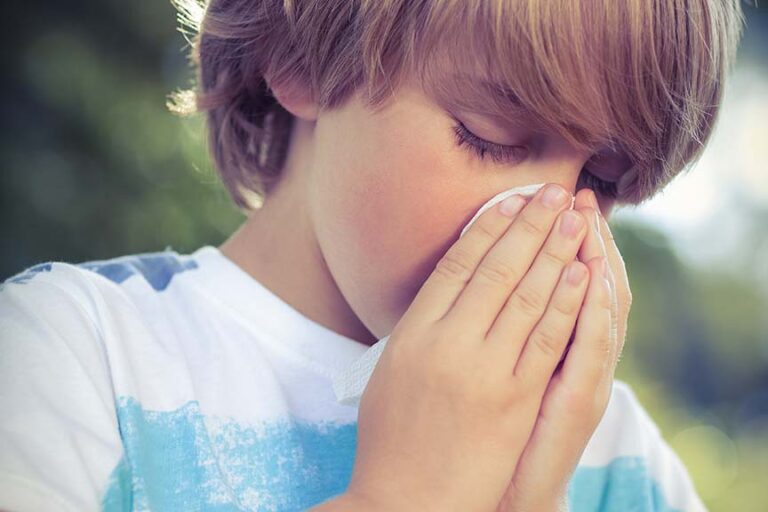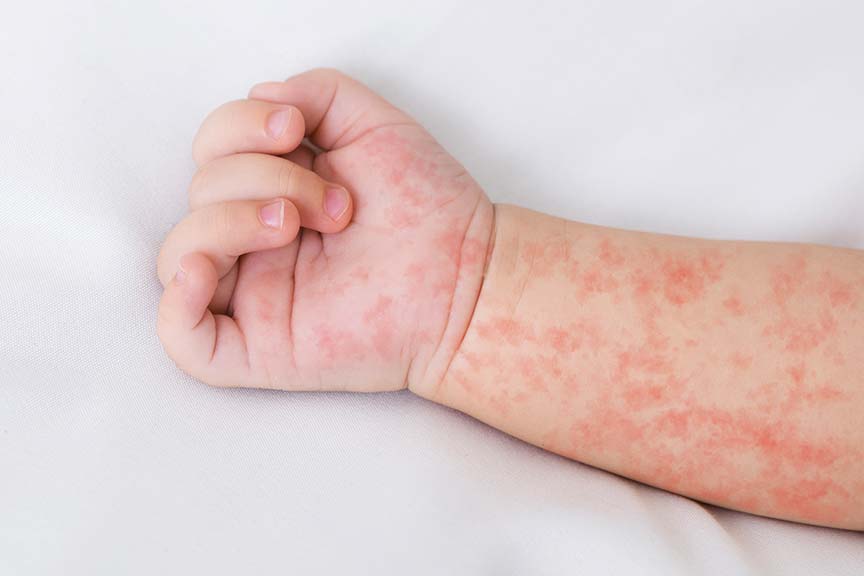Our Services
- Allergy Skin Testing for Food & Environmental Allergies
- Penicillin Skin Testing
- Drug Desensitization
- Pulmonary Function Testing
- Patch Testing
- Oral Food Challenges
- Biologic Drug Therapy
- Immunoglobulin Therapy
- Asthma Education
- RUSH Immunotherapy
- Traditional Immunotherapy
- Cluster Immunotherapy
Conditions We Treat
Allergic Rhinitis
Allergic rhinitis, commonly called hay fever, is an inflammatory condition that results in a combination of symptoms including sneezing, nasal congestion, itching, runny nose, and/or post-nasal drip. It is caused when your immune system becomes sensitized to and then overreacts to a substance which is typically harmless in nature. Based on physician diagnosis, allergic rhinitis affects approximately 15% of people in the United States. However, self-reported diagnosis estimates the prevalence to be as high as 30% of the US population. Allergic rhinitis commonly contributes to missed or unproductive time at work and school, sleep problems, and decreased involvement in outdoor activities. Some studies have even found allergic rhinitis symptoms to worsen or contribute to depression, attention deficit, and memory or learning problems.


Anaphylaxis
Anaphylaxis is a very serious and potentially life-threatening allergic reaction. It can occur within seconds of exposure. Symptoms can include dizziness or fainting, difficulty breathing, wheezing, swelling, hives, itching, abdominal pain, nausea, vomiting, and diarrhea. The most common causes of anaphylaxis are food allergies, insect allergies (wasps, hornets, bees, fire ants), medication allergies, and latex.
Anaphylaxis requires immediate treatment including prompt administration of epinephrine. Avoidance of the trigger going forward is vital. The physicians at Park Cities Allergy & Asthma can help determine the cause of anaphylaxis and how to prevent another episode in the future.
Drug Allergy
A drug allergy is an abnormal immune reaction to a medication. Symptoms commonly include rash, fever, and hives. Symptoms can also include difficulty breathing, wheezing, itching, swelling, abdominal pain, vomiting, and loss of consciousness. Any medication including over the counter medications, herbals, supplements, can cause allergic reactions, but some medications are more likely to than others. The most common medications to cause allergic reactions are penicillin and similar antibiotics, sulfa drugs, Non-steroidal anti-inflammatory drugs (such as aspirin and ibuprofen), anti-convulsants, and chemotherapy drugs.


Food Allergy
Approximately 1 in 13 children and 1 in 10 adults in the United States have food allergies. A food allergy is an abnormal response to a food triggered by the body’s immune system. Symptoms can include rash, hives, itching, vomiting, diarrhea, trouble breathing, wheezing, and even loss of consciousness. Food allergic reactions can be very serious, and in some cases, lead to death. Therefore, if you have a food allergy, it is extremely important to know what the trigger food is and how to avoid it. In the United States, 8 foods cause over 90% of food allergic reactions. These include peanut, tree nuts, wheat, soy, egg, cow’s milk, shellfish, and finned fish.
Immune Deficiency
An immune deficiency is caused when part of the immune system is absent or not functioning properly. When the deficiency is secondary to hereditary or genetic causes, it is called a primary immune deficiency. When the deficiency is caused by other reasons such as malnutrition, chemotherapy, HIV, etc., the deficiency is called a secondary immune deficiency. Signs of an immune deficiency include recurrent, unusual, or difficult to treat infections, poor growth or weight gain, recurrent deep abscesses, family history of primary immune deficiency, chronic diarrhea, persistent thrush or other fungal infections, or need for IV antibiotics.
If you are experiencing recurrent infections, the physicians at Park Cities Allergy & Asthma can determine the cause and help you live a healthier life.


Atopic Dermatitis
Atopic dermatitis, commonly called eczema, is caused by skin barrier dysfunction which results in dryness and inflammation. It presents as dry, red, itchy skin. It is very common affecting 1 in 5 infants and 1 in 50 adults. Children who have a family history of allergic disease such as asthma or hay fever or more likely to develop atopic dermatitis. Atopic dermatitis is considered to the best first step in the atopic march. The atopic march involves the development of allergic conditions including eczema, food allergy, allergic rhinitis, and asthma, typically in that order. Up to 80% of children with eczema will go on to develop asthma and/or allergic rhinitis.
Hives
Urticaria is the medical term for hives. Hives are red whelps or bumps that are extremely itchy. About 20% of the population will experience hives at some point in their lives. Hives are considered acute if they last no longer than 6 weeks and chronic if they last longer than 6 weeks. Acute hives are often caused by medication allergy, food allergy, or insect allergy. Acute hives can be caused by non-allergic triggers such as infections, heat, cold, and exercise. Chronic hives are rarely caused by specific triggers.
The allergists at Park Cities Allergy & Asthma Care can help determine the cause of hives and the best way to manage them.


Angioedema
Angioedema is swelling of the tissue beneath the surface of the skin. It commonly occurs with hives but can occur on its own. It presents as swelling of the eyes, lips, tongue, hand, and/or feet. Swelling can also occur in the abdomen. If swelling of the throat develops, this can be life threatening and requires immediate medical attention. Swelling can be related to an allergic reaction, medications, or hereditary.
Your allergist and Park Cities Allergy & Asthma can determine the underlying mechanism of the swelling to help determine the best treatment.
Contact Dermatitis
Contact dermatitis is a rash that occurs due to direct contact of the skin with an allergen. The contact will produce a red, bumpy, itchy rash. Some of the most common culprits of contact dermatitis or poison ivy and nickel. If you have a nickel allergy, you can develop a rash after wearing jewelry that contains even a small amount of nickel. It is possible to become allergic to ingredient in your personal hygiene products such as soap, shampoo, make-up, and sunscreen.
The allergists at Park Cities Allergy & Asthma Care can help determine your contact allergens through patch testing.


Asthma
Asthma is a chronic airway disease characterized by inflammation and swelling of the walls of your airways, and may be triggered by things that you are allergic to or find irritating. When the airways react, they get narrower, and this causes symptoms like wheezing, coughing, chest tightness, and trouble breathing, especially at night and in the early morning. Asthma cannot be cured, but most people with asthma can control it so that they have few and infrequent symptoms and can live active lives.
Chronic Cough
A chronic cough is a cough that lasts longer than 8 weeks in an adult and 4 weeks in a child. Chronic cough can affect sleep, work/school performance, and social activities. The most common reasons for a chronic cough are asthma, post nasal drip, and reflux.
Your allergist at Park Cities Allergy & Asthma can help pinpoint the cause of the cough and recommend treatment for resolution.

Our Patients are Happy & Healthy
"Always happy and friendly staff. Very attentive to my needs and willing to listen when I have questions."
Tayler Owen
"Great office with really nice staff. When compared to prior allergist offices, they are super organized and also very available/responsive. I did my rush therapy with new vials here and had no issues. Dr Schroeder and her staff are wonderful!"
Michael Youssef
"The team at Park Cities Allergy and Asthma are diligent, patient, knowledgeable, and thoughtful. They worked collaboratively with other physicians and developed an optimal treatment that has changed my life. Words aren’t enough but I would highly recommend PCAA for everyone. Thank you so much for all that you do! Cheers!"
Michael Munoz
Get Started
Billing Questions
Contact Felicia Melendez at felicia@pcaaa.com

